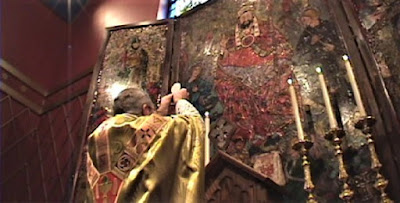Jesus went on with his disciples, to the villages of Caesarea Philippi; and on the way he asked his disciples, "Who do men say that I am?" And they told him, "John the Baptist; and others say, Elijah; and others one of the prophets." And he asked them, "But who do you say that I am?" Peter answered him, "You are the Christ." And he charged them to tell no one about him. And he began to teach them that the Son of man must suffer many things, and be rejected by the elders and the chief priests and the scribes, and be killed, and after three days rise again. And he said this plainly. And Peter took him, and began to rebuke him. But turning and seeing his disciples, he rebuked Peter, and said, "Get behind me, Satan! For you are not on the side of God, but of men."-St. Mark 8:27-33
Caesarea Philippi was outside of Galilee and it had a long pagan history. In ancient times it had been a great center for the worship of Baal and also it was said to be the birthplace of the Greek god Pan, the god of nature. From a cave in the hillside there is a stream gushing out which was considered to be the source of the River Jordan, and further up on that same hillside there was a gleaming temple of white marble which had been built in honor of Caesar, the Roman Emperor, who was regarded as a god.
It was there, in that center of pagan worship, that Peter was inspired to recognize Jesus as the Christ. This place which had echoed with reverence toward pagan gods, and memories of Baal, with the huge marble temple to Caesar – like a backdrop of all religions and history – it was there that St. Peter made his great confession. It comes in the very middle of St. Mark’s gospel, and it serves as the climax of the whole Gospel.
And then Jesus decided to put His disciples to the test. He asked them what men were saying about Him, and He heard from them the popular rumours and reports. But then He put the question which meant so much. “Who do you say that I am?” And suddenly Peter realized what he had always known deep down in his heart. This was the Messiah, the Christ, the Anointed One, the Son of God.
And then we see Jesus do and say what He has done before. No sooner had Peter declared this, than Jesus told His disciples that they must tell no one. Why? Because, first and foremost, Jesus had to teach Peter and the others what Messiahship really meant – not the common, mistaken Jewish notion of Messiahship which looked for an earthly military leader, but the truth about the Messiah, as it was demonstrated in the life, death, and resurrection of Jesus Christ.
When Jesus connected Messiahship with suffering and death, He was making statements that were, to the disciples, both incredible and incomprehensible. All their lives they had thought of the Messiah in terms of conquest and nationalistic victory, but now they were being presented with an idea which was utterly revolutionary. That’s why Peter protested so strongly. To him, the whole thing seemed impossible.
But why did Jesus rebuke Peter so sternly? Because Peter was putting into words the very temptations which Satan had put to Jesus in the desert. The turning of stones into bread, the claim of an earthly kingship – all that was offered by Satan to Jesus in the wilderness, if only Jesus would kneel down and do homage to Satan. And what made this even worse was that Peter was one who was loved by Jesus – it was Peter’s loving voice that was saying all of this – and this is why Jesus answered so sternly.
__________________________________
Image from the Bruchsal Codex (Evangelistar von Speyer), c. 1220














